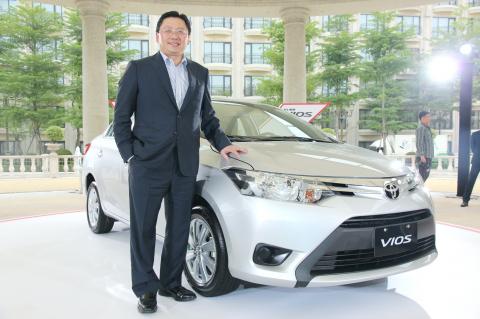Hotai Motor Co (和泰汽車), the leading car distributor in Taiwan, yesterday said it aims to sell 12,000 cars this month, supported by sales of its newly launched Vios subcompact car.
Eli Huang (黃明顯), director and chief officer of Toyota and Hino operations at Hotai, said it forecast sales of 1,400 new Vioses and 4,000 units of its flagship Altis sedan, as well as other Toyota and Lexus models, at a launch yesterday in Greater Kaohsiung.
Targeting first-time buyers, Hotai has set prices for the new Vios between NT$519,000 and NT$569,000 (US$17,075 and US$18,700), lower than rival models, such as Yulon Nissan Motor Co’s (裕隆日產) Livina subcompact and Big TIIDA family car, Huang said.

Photo: Yang Ya-min, Taipei Times
“We believe cars of this range should be affordable,” he said.
Huang said demand for 1.5-liter engine cars and 1.6-liter models is about 30,000 to 40,000 units a year.
The company plans to sell 6,000 new Vioses from this month through June, and 16,000 units overall this year, he added.
In the overall market, Hotai expects car sales this month to grow 18 percent to 34,000 units from 28,844 units a year ago, supported by new car launches including the new Vios and Livina, but stay comparative to the 34,307 units sold last month, according to industrial data.
Last quarter, total car sales reached 99,404 units, up 10.1 percent from a year ago, according to Chunghwa Telecom Co (中華電信) data.
Hotai continued to lead the market by selling 30,341 cars last quarter, accounting for 30.5 percent of the market.
Company president Justin Su (蘇純興) said the company’s market share last quarter was below the 34 percent target it set for this year because of US and Japanese production constraints for the new Altis and RAV-4 SUV.
“Because of severe weather conditions in North America, Toyota Motor Corp’s factories in the region were shut down, and its factories in Japan had to ship more RAV-4 parts to the US, reducing the number shipped to Taiwan,” Su said.
Su said the company plans to raise its market share above 34 percent this quarter and increase revenue by 10 percent from last quarter’s NT$11.07 billion.
The company maintained its forecasts that total car sales would reach 390,000 units this year, with Hotai taking 34 percent of the market, Su said.
This story has been updated since it was first published.

BYPASSING CHINA TARIFFS: In the first five months of this year, Foxconn sent US$4.4bn of iPhones to the US from India, compared with US$3.7bn in the whole of last year Nearly all the iPhones exported by Foxconn Technology Group (富士康科技集團) from India went to the US between March and last month, customs data showed, far above last year’s average of 50 percent and a clear sign of Apple Inc’s efforts to bypass high US tariffs imposed on China. The numbers, being reported by Reuters for the first time, show that Apple has realigned its India exports to almost exclusively serve the US market, when previously the devices were more widely distributed to nations including the Netherlands and the Czech Republic. During March to last month, Foxconn, known as Hon Hai Precision Industry

Taiwan Semiconductor Manufacturing Co (TSMC, 台積電) and the University of Tokyo (UTokyo) yesterday announced the launch of the TSMC-UTokyo Lab to promote advanced semiconductor research, education and talent development. The lab is TSMC’s first laboratory collaboration with a university outside Taiwan, the company said in a statement. The lab would leverage “the extensive knowledge, experience, and creativity” of both institutions, the company said. It is located in the Asano Section of UTokyo’s Hongo, Tokyo, campus and would be managed by UTokyo faculty, guided by directors from UTokyo and TSMC, the company said. TSMC began working with UTokyo in 2019, resulting in 21 research projects,

Ashton Hall’s morning routine involves dunking his head in iced Saratoga Spring Water. For the company that sells the bottled water — Hall’s brand of choice for drinking, brushing his teeth and submerging himself — that is fantastic news. “We’re so thankful to this incredible fitness influencer called Ashton Hall,” Saratoga owner Primo Brands Corp’s CEO Robbert Rietbroek said on an earnings call after Hall’s morning routine video went viral. “He really helped put our brand on the map.” Primo Brands, which was not affiliated with Hall when he made his video, is among the increasing number of companies benefiting from influencer

Quanta Computer Inc (廣達) chairman Barry Lam (林百里) yesterday expressed a downbeat view about the prospects of humanoid robots, given high manufacturing costs and a lack of target customers. Despite rising demand and high expectations for humanoid robots, high research-and-development costs and uncertain profitability remain major concerns, Lam told reporters following the company’s annual shareholders’ meeting in Taoyuan. “Since it seems a bit unworthy to use such high-cost robots to do household chores, I believe robots designed for specific purposes would be more valuable and present a better business opportunity,” Lam said Instead of investing in humanoid robots, Quanta has opted to invest